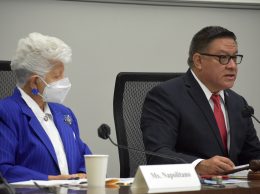Editorial: New generation sets challenge for Congress
With graduation season in full swing, it may be instructive to take a look at how the next generation of civic and business leaders views the current state of play in politics.
Suffice it to say, that view is dim. A report from the Panetta Institute for Public Policy, a think tank located at the CSU Monterey Bay campus in Seaside, underscores why.
By overwhelming numbers, young people are pessimistic about the nation’s direction and its leadership. They want the grownups in Washington, D.C., to act like grownups — take action on the deficit and compromise, when necessary, to craft a viable solution.
The Panetta Institute, founded by CIA Director Leon and his wife, Sylvia, has been surveying college-age students for a decade. For many years, Leon Panetta represented the Monterey area in the U.S. Congress.
Their latest survey shows that 50 percent of students believe America is on the wrong track, up from 39 percent a year ago.
Right track respondents have fallen to 37 percent from 53 percent.
Students’ poor attitudes toward the nation and its future stem from two directions. First, 85 percent of all students believe the economy is “not so good” or “poor.”
Second, some 76 percent of students believe members of Congress of both parties should be willing to compromise to reach agreement on big picture issues such as entitlements and the deficit. Most students believe that balancing the budget should be a top priority, rather than expanding government to help boost the economy.
Among the few hopeful signs: Some 47 percent of young people say they’d be willing to work in government compared to just 26 percent a decade ago.
On the economy, more than 60 percent of students believe the worst of the recession is behind us.
Our takeaway from the survey is that America’s future voters are going to set a very high standard for this Congress. They believe the right narrative for the next decades looks to the Reagan and Clinton-era budget compromises that set the stage for sustained economic growth.
A change in that narrative will dramatically impact future voters, and politics, for years to come.
The 2011 Survey of America’s College Students was done by Hart Research Associates of Washington, D.C.











